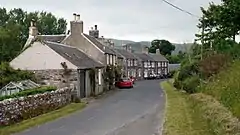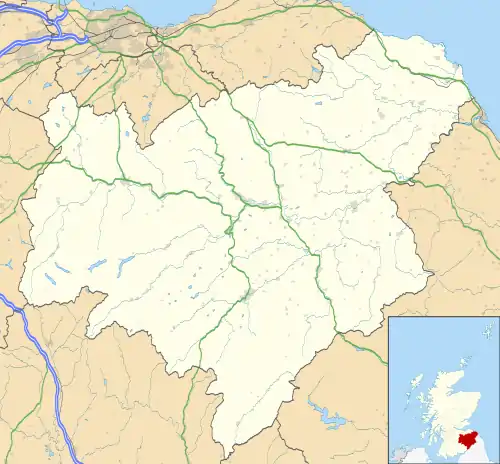Hownam
Hownam or Hounam[1] is a small village and parish situated 8 miles east of Jedburgh in the Scottish Borders area of Scotland, near the Anglo-Scottish border, in the former Roxburghshire.
| Hownam | |
|---|---|
 Hownam village centre | |
 Hownam Location within the Scottish Borders | |
| OS grid reference | NT778191 |
| Council area | |
| Lieutenancy area | |
| Country | Scotland |
| Sovereign state | United Kingdom |
| Post town | KELSO |
| Postcode district | TD5 |
| Dialling code | 01573 |
| Police | Scotland |
| Fire | Scottish |
| Ambulance | Scottish |
| UK Parliament | |
| Scottish Parliament | |
Hownam lies south of Morebattle on the Kale Water.[2] The parish borders England and has, within its boundaries, the Roman road of Dere Street and the Pennymuir Roman camps.[2] Hownam first appears in the written charters in the 12th century.[2] The origin of the name is uncertain, but may indicate a tribal name, "the Hunas".[2] The village itself is a small group of houses in a row on one side of the road.[2] The village church is at the north end of the village.[2] The church was reshaped in the 1750s and further modernised in the 1840s, and again following a fire in 1907.[3]
Local nurseryman George Taylor was born at Hounam Grange in 1803.[4] He emigrated to Kalamazoo, Michigan in 1855, and became known as George "Celery" Taylor because he introduced commercial celery growing to the United States.[4]
References
- Hounam, National Library of Scotland
- Hownam Parish, www.morebattle.bordernet.co.uk, retrieved 8 May 2014
- Hownam, www.cheviotchurches.org, retrieved 8 May 2014
- George "Celery" Taylor, www.morebattle.bordernet.co.uk, retrieved 8 May 2014
External links
| Wikimedia Commons has media related to Hownam. |
